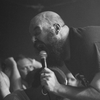In the past six years, Christoph and Anton Hochheim—identical brothers known for their affiliation with The Pains of Being Pure at Heart and The Depreciation Guild—have settled back into the westerly gridlocked sprawl of Los Angeles. Now separately based in the eccentric hillside suburbs of Echo Park and the beachfront resort town Santa Monica, both brothers still tour with the Pains, perform on occasion with Dent May, and contribute to their own projects. Anton drums for the queencore band Hit Bargain while Christoph has tinkered meticulously with Ablebody, a personal vehicle that has evolved from gauzy soundscapes and remixes to enigmatic sophisti-pop. The latter’s payoff is the debut album Adult Contemporaries: ten tracks tagged as melodramatic pop songs spanning two separate periods of Christoph’s life—pulling from innumerable far-flung influences like Prefab Sprout, Burt Bacharach, Kate Bush—and an idiosyncratic cover of The Servants’ ‘The Sun a Small Star’.
Christoph greets me outside his residence in all-black thrifted attire with bedhead hair: he spent much of the day finalizing the album’s lyric sheet, subsisting off LaCroix Pamplemousse. He laments that Anton could not be with us.
He offers a can, and we head up the stairs to his room in a two-story flat at the heart of Echo Park. The walls are cramped with Kate Bush and Pains posters, recording equipment, and a sunburst Mustang guitar. We break bread over the sparkling water brand’s resurgence and meme status, before considering the most important question: is Ablebody’s debut album title Adult Contemporaries a jab at the genre recently dominated by Adele?
Christoph passes off the blame; according to him, it was Anton who conceived the deceptively innocuous idea. “We had a long text thread and [Anton] threw that one out. And we both immediately knew that was the perfect title for it, for a few reasons. There’s a slight nod at adult contemporary music, which we’re self-conscious that maybe this record is slightly tinged in—it’s something most people would consider cheesy, either in the chords or the production. There’s something romantic and flowery about this record that people, who don’t like adult contemporary music, would not like.
I think this was more a jab at ourselves than the genre. I think also there’s the acknowledgement that we are getting older, as people. My brother and I just turned 30, so we’re not really kids doing this anymore. We’re very much adults; we’re contemporaries.” This admission comes at the tail-end of a lot of personal reflection and reconciliation for Christoph, who conceived of Ablebody during a tumultuous period of his life: he was dealing with a fair amount of feels from past relationships, and since he began rolling with the Pains in 2009, tour life had worn him out.
“I think it was just the wear and tear of the road mixed with meeting people on the road who had been doing it for a lot longer than I have, and seeing either where they were physically or mentally, just seeing how that sort of lifestyle worked out. And I think pretty much across the board it was a disappointing experience, and one that actually threw a lot of red flags in my face. Like—is this really taking me someplace that I want to be?”
While on tour, Christoph drafted the beginnings of Ablebody strictly on a laptop, a limitation he felt was neither helpful nor fruitful. If not for the perfect opportunity, Christoph admits he might not have had the bravado to pursue Ablebody. “We had a month’s break before a pretty lengthy Asia tour, and it just seemed like a good time for me to leave, and they could get someone up to speed, and my brother moved back to LA a year prior to that, and I was sending him the demos and stuff.”
In time with the 2011 dissolution of The Depreciation Guild, Ablebody’s first fruits of labor were self-released without much fanfare: a four-track album Remexès with—you guessed it—four remixes, including one previously released under The Depreciation Guild; an EP of covers for semi-obscure new wave and pop; and the taped-up, scratched-out feedbacking oddity ‘High Home’, the residuals of his shoegazing past.
As time went on, Christoph would bounce more ideas off Anton and eventually compile the All My Everybody EP, which featured a cover of Harry Nilsson’s ‘Sister Marie’ and the first psychedelic lovelorn rumination, ‘Sally Hot Jazz.’ Ablebody officially became the Hochheim brothers’ project after that release.
“I’ve always played music with my brother, and even him as just the sounding board is more valuable than most people might even recognize. Just playing things for him and getting a response and even having him rethink rhythmic ideas, or change the drum track, really does help bring things to light. So I think now it’s definitely a duo, at least in terms of the recorded output. It’s just the two of us.”
Because the presentation of Ablebody drastically shifted from solo bedroom project to recording duo, and finally to live quartet (with Daniel Rosenbaum and Jordan Sabolick), Christoph maintains that a lot of considerations were taken to maintain cohesion and authenticity in Adult Contemporaries.
“[Songwriting] is a very singular experience, and a fairly isolated one, and it’s not until the final stages where I design something…to expand on that with more the idea, of how we can make this a more palatable expression live. But we pretty painstakingly maintain a lot of aspects from the demos and did our very best to maintain the spirit of spontaneity in the final product, which I do think is something that I’m still figuring out and something that I struggle with all the time.” To harness the raw spirit of a single-take demo is quintessential to achieving that spontaneity, Christoph explains. It’s something he hasn’t quite mastered, but not for lack of effort.
“I think there's something sacred with the demo, the moment of inception of the song. I think it’s pretty audible, and I think there’s something with that moment where, if you can capture it in a hi-fi way, it could be the final product. At the time I wrote a lot of these songs, I didn’t have a lot of equipment to make what I was demoing the final product. With the latter half of this record, I’d say most of the tracks are pretty close to how I had initially envisioned them, and we just took huge blocks of sound from the demos. Putting my mic on the floor of the bathroom, and playing guitar or something. We’d spend hours trying to recreate that and realize that the original demo tracks are better.”
Under direction from producer Kenny Gilmore (Ariel Pink, Nedelle Torrisi, Angel Deradoorian), Christoph and Anton worked in a converted studio garage for entire days, tracking instruments and vocals judiciously, without pitch correction software. “It was a pretty intense experience just trying to make something that feels real in a situation that I don’t find the most comfortable, having my producer and my brother standing right there. So it was a learning experience for me.”
I ask if the lyrical weight imposed any emotional difficulties, or whether it was therapeutic to sing day-in and day-out on relationship retrospectives, self-doubt, and claustrophobia-induced madness (“Gaucho”) to jangly chord voicings.
“Maybe even the act of just singing them every night is the therapeutic part. But I think the act of writing it isn’t necessarily that. It’s kind of an exercise of just placing myself back in that space. And I put in a lot of work to remove myself from that space, at least for the first half of the record, with songs that were more directly influenced by particular occurrences. I think at that time it was all I could write about. I don’t know if it was difficult; I was pretty numb at the time. But it was at the forefront of my mind, and I just generally have a liking for sentimental pop lyrics. There’s a certain inherent truth and universal appeal to it. It just doesn’t seem like there’s any point in trying to write any other type of song, which is funny considering Kate Bush is one of my biggest influences ever, but she doesn’t write that way lyrically.”
Kate Bush’s lyrics—stories often tackling sensitive, darker topics like incest and suicide—were predominantly laid onto lush and upbeat melodies. And Ablebody’s musical output, while not nearly as taboo, is definitely inspired by the juxtaposition of bleakness with buoyancy.
“I don’t necessarily like the sound of morose music; I think that’s something I used to be into and I think that’s a product of growing older. Morose music sounds very heavy-handed and I feel like the emotion it’s trying to portray just immediately sounds nullified to me. But the saddest music is very hopeful and optimistic-sounding, and that’s just a more potent space to work from.”
He crosses his legs and sips the LaCroix.
“The sound of a defeated person with nothing left but a happy song to whistle is much more tragic than just somebody moaning and complaining to a modern chord progression,” he says matter-of-factly. But whether the composite character is moaning and complaining or whistling that happy song, Christoph practices restraint when drawing from his own inspirations; he’d much rather go over it all with a Gaussian blur. While songs like ‘Heartkeep’ endeavor to be more transparent, others like ‘One Dime A Day’ and ‘Powder Blue’ are inextricably nebulous, forcing listeners to add context from their own lived experiences.
“I’ve never gravitated towards lyrics that were very particular and I think a lot of traditional folk music for me is a little too heavy-handed in references. I like to paint as broad strokes as possible so anybody can insert themselves into the song. I think that’s what I love in the lyricists that I respect greatly. It’s something that I make an effort to do.”
That’s one of the reasons Ablebody has taken almost five years to complete Adult Contemporaries: after laying the structure and arrangements to each song—considerably easier given his background as guitarist, sound engineer (Anamanaguchi’s Endless Fantasy), and score composer (Someone Else’s Heart)—Christoph focused much of his time devising and revising the lyrics. A passion project like Ablebody can afford the luxury of time, but Christoph sees the benefit of project deadlines; he quips that it’s felt like a lifetime getting Adult Contemporaries out. “When we were finishing this record, I think we were all experiencing a loss in perspective, so I was asking everyone for opinions just because I had no objective sense in it anymore.” Future releases, Christoph says, will have definitive schedules and might venture into minimalist territories—he’s always had a thing for concise structures and prominent vocals. “I’m just really excited for the next formation of Ablebody, which I think is something people will like, that’s a bit different, a lot less contemporary. I just want it to be something that I feel is being misrepresented in this musical climate and...”
He trails off into thought before recomposing. It might not even be under the Ablebody moniker if listeners and critics pigeonhole the project’s sound. But Christoph’s not one to make forward-looking statements; everything’s up in the air. “I feel like I’m being too oblique about this and I don’t want to put any misconceptions as to what the new formation is gonna be anyways. But I just want it to be a very different presentation and musically to be something people haven’t heard from me, or in general. Hopefully.”
The sun has all but set—Christoph’s expression is illuminated only by a warm lamplight. I thank him for taking the time to speak with me, and he smiles.
“Thanks, I wish my brother were here.”
Photo credit: Michelle McCausland.






















